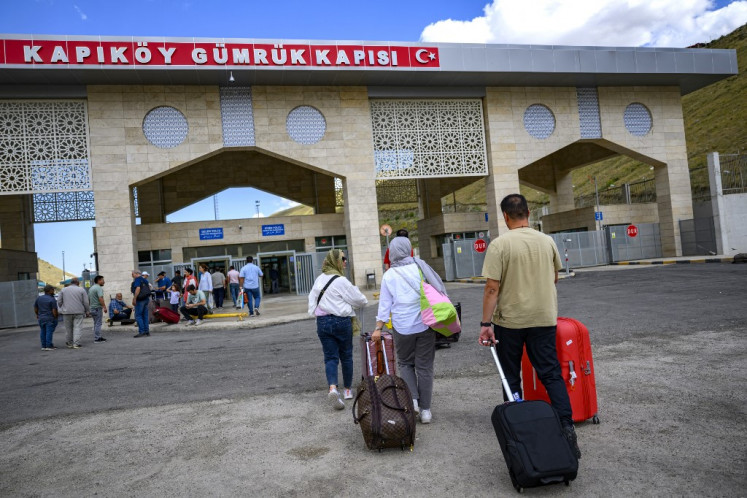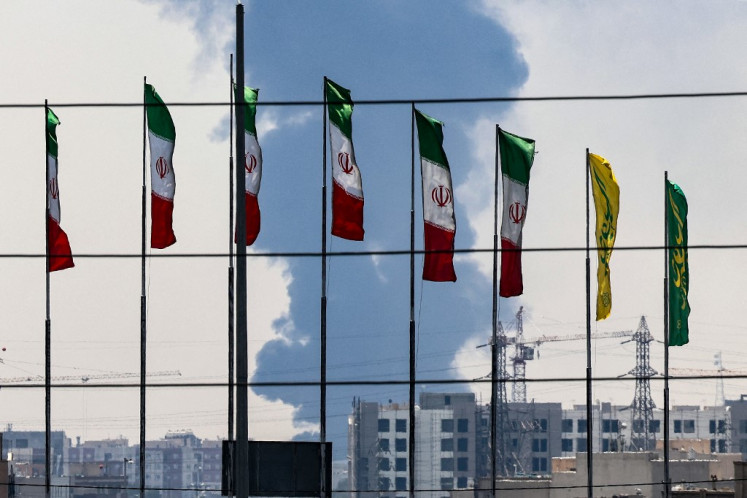Popular Reads
Top Results
Can't find what you're looking for?
View all search resultsPopular Reads
Top Results
Can't find what you're looking for?
View all search resultsWhy is Asian infrastructure bank different?
In June, 50 member countries of the Asian Infrastructure Investment Bank (AIIB), among 57 founding members, formally signed the much awaited Article of Agreement (AoA)
Change text size
Gift Premium Articles
to Anyone

I
n June, 50 member countries of the Asian Infrastructure Investment Bank (AIIB), among 57 founding members, formally signed the much awaited Article of Agreement (AoA). The AoA of the AIIB confirms the rationale behind its establishment by putting a full stop on various speculations. The purpose is to protect Asian economies from global shocks and untying control of post-war global economic structure.
The AoA distinctly shows the differences from rest of the international financial institutions (IFIs) dominated by the West like the World Bank, ADB, EBRD, IMF and IADB. The objective of the AIIB is to invest in infrastructure specific projects and programs to sustain development with social importance and promote stable economic growth among Asian countries.
First, the AIIB aims to get rid of financing bottlenecks facing many Asian countries and to make countries resilient against global economic shocks. The examples are fresh elsewhere for such logjams that have cornered Greece and Argentina lately. While performing a shock absorber's role, the AIIB actually dismantles the post-war US-led economic order, at least in Asia. No other multilateral financial institutions have made such a pronouncement in their Agreements or Charters.
Be it the 1944 Agreement of International Banks for Reconstruction and Development (IBRD) ' an arm of the World Bank ' or the 1966 Charter of the Asian Development Bank (ADB) or the 1991 Agreement of the European Bank for Reconstruction and Development (EBRD), they all aim at integrating developing countries' economies into international trade and facilitating a market economy, which traditional donors like the US and EU countries have been managing and controlling.
In a further step, the ADB was established for post-war construction in the line of the World Bank but self-claimed as Asian in its basic character ' 'Asia-ness'.
The governance of AIIB as enshrined in AoA is also unique. Perhaps, for the first-time in the history of intergovernmental institutions, especially financial institutions, traditional donor countries lost the top three slots as largest shareholders which transforms into voting powers in decision making. In ADB, both the US and Japan hold the largest shares among 67 member countries. Both are not members of the AIIB, yet. In IBRD and EBRD too, the US is the single largest shareholder. In AIIB, the proponent China holds the largest share followed by India and Russian Federation.
Inclusion of Russia as a regional member and third largest shareholder in AIIB has dismantled the post-world war and subsequently the post-Cold War world economic edifice. Russia's position in the EBRD, which extends financial assistance to most former Soviet republics among others, in terms of decision making is seventh, while in the IBRD is eighth.
It is not only the shareholding which gives the AIIB a distinct character from rest of the institutions, but also the composition of its board of directors (BoDs). The Governors (generally finance ministers) of 37 regional members will select nine representatives while 20 non-regional members will choose three for the 12-member BoDs as envisaged in the AoA. In the ADB, eight members are elected by 48 regional members and four by the 19 non-regional members. The representation in the AIIB BoDs has embedded its Asian character.
With more than a quarter of total shareholding, China has already explained that as new members come in it will be reduced. The introduction of 'Special Majority' and 'Super Majority' during voting for institutional decision making by governors is a welcome step. A Super Majority vote shall require two-thirds of total number of governors, i.e., 38 members and representing not less than three-fourths of the total voting power of the members. A Special Majority shall require a majority of the member countries and representing not less than a majority of total voting power. The president of the AIIB, who is the legal representative of the bank and head of management, shall be elected by the governors through a Super Majority. In the World Bank and the ADB, it is the BoDs who select the president.
Unlike in the ADB or the World Bank or EBRD, the BoDs of AIIB shall function on a non-resident basis, meaning they won't permanently sit at the headquarters in Beijing. The AoA provisions seem to downsize the rigidity of bureaucracy experienced by the ADB and the World Bank. A similar echo of present NDA government's motto 'less government, more governance' has inspired the AIIB.
There is a logical reason too as China's bitter experiences mostly in the ADB in 2009 related to India's Country Partnership Strategy document and Fuzhou Environmental Improvement Project where BoDs decided to send a review team to investigate the policy violations in China. In addition, strategy to dissuade the interaction and access of civil societies to BoDs and for security reasons (read cancelation of visas of British parliamentarians to meet Hong Kong protestors), the BoDs are placed in non-resident mode as of now.
With China's longstanding border disputes with neighbors and developments in the East China Sea, the AIIB has cautiously traded issues related to disagreements or disputes which are potentially high in Asia. The disagreement over a termination of a project funded by AIIB should be resorted to a three member tribunal that consists of representative of the country where the project is terminated, one from the bank and one as appointed by the president of the International Court of Justice, which is unique.
Respecting the sovereignty as sacrosanct, the bank is not going to fund any projects or programs or undertaking in the territory if 'that' member objects to such financing. However, like the ADB, the AIIB has not clarified funding in disputed territory. In all probability, the bank will avoid becoming entangled in disputed territory.
With much more progressive wording than its old counterparts, the AIIB ensures that each of its operations are in compliance with the bank's operational policies, which shall be developed by the BoDs, including addressing environmental and social impacts (safeguard policies). Many governments, including the US government, are concerned about the AIIB's lack of social and environmental safeguards. However, the AIIB tumbles a step behind by allowing member countries' procurement policies which are in shambles to be used in bank operations in those countries.
Although the charters of most of the financial institutions are similar, the AIIB has mentioned social development in its AoA itself. It is heartburning for sympathizers of Bretton Wood's Siamese twins to see the pace and large support for the AIIB. The AIIB also fairly accommodates BRICS members allowing Brazil and South Africa as non-regional members. The AIIB will compliment and supplement the New Development Bank (NDB) for its global reach. It is neither required of critics of globalization to defend AIIB, nor of the US plus to approve the establishment of Asia's own multilateral financial institution, which truly represents 'Asia-ness'.
__________________________
The writer is senior research fellow, Indian Institute of Technology-Madras, Chennai, India. The views expressed are his own.









